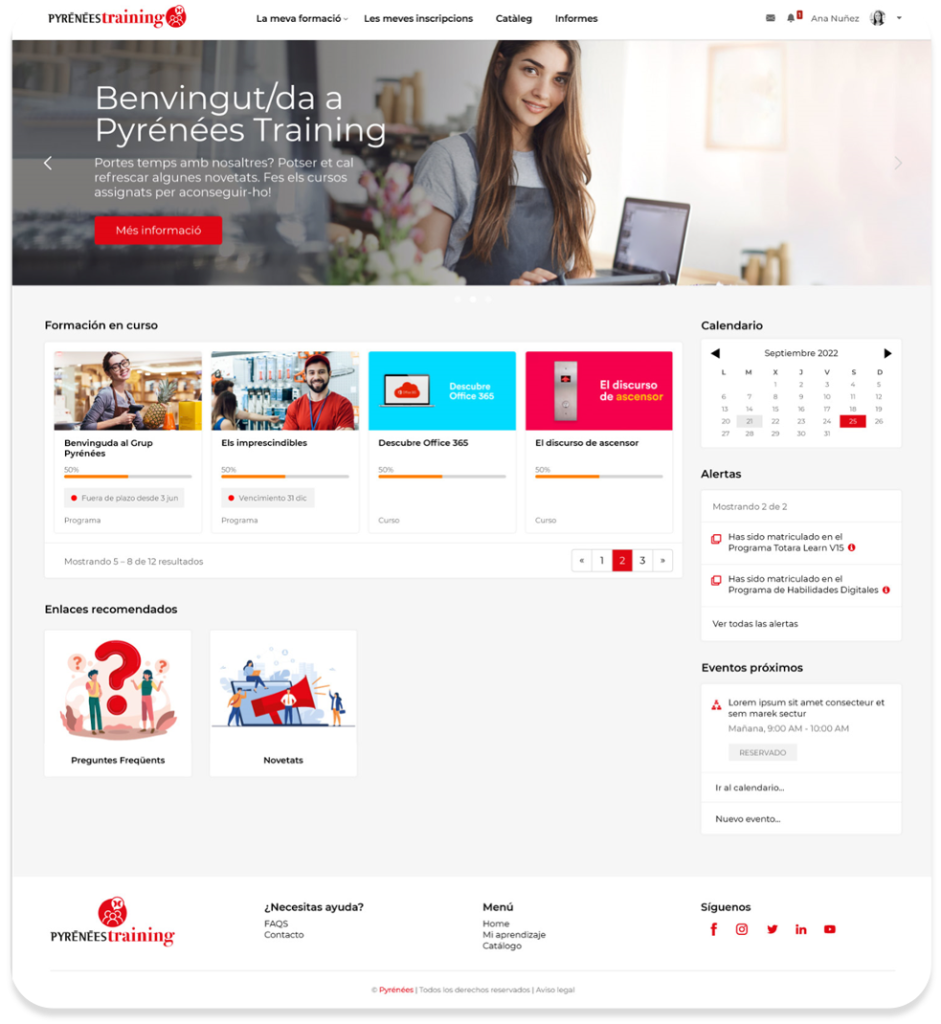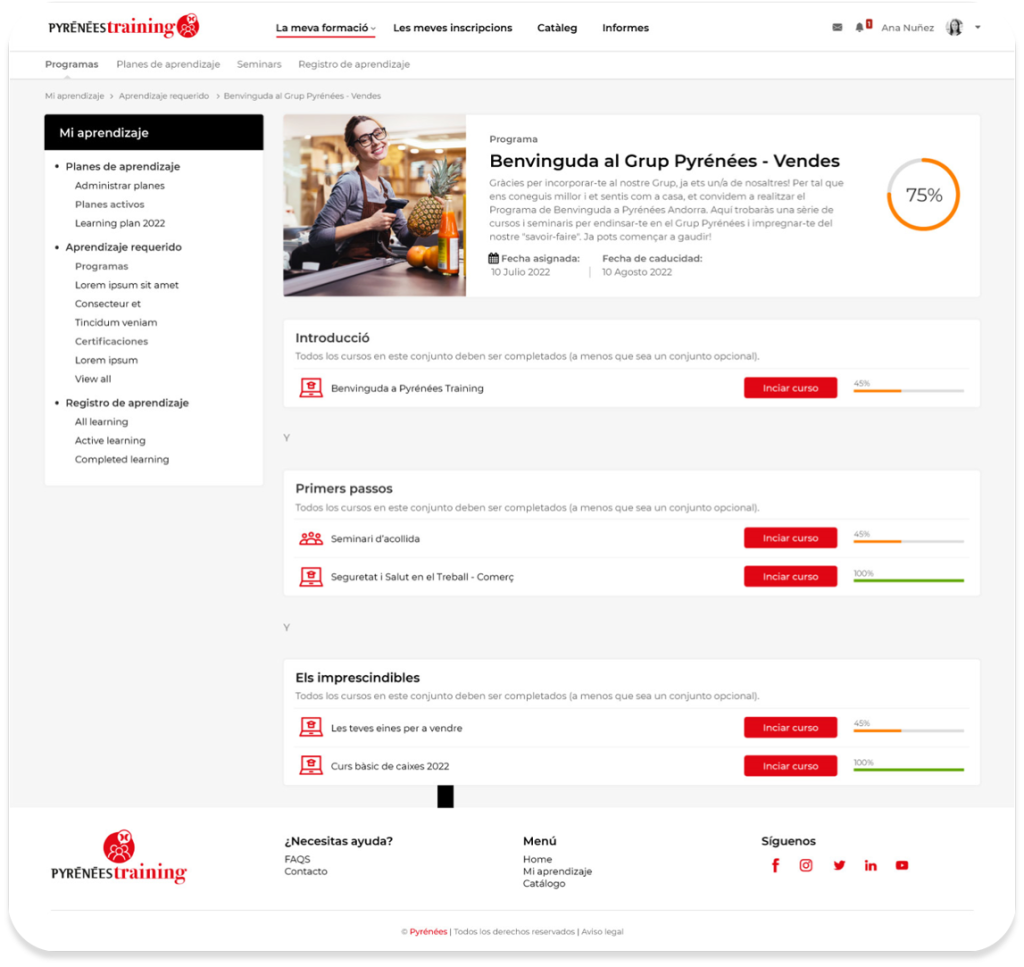Grup Pyrénées Andorra stands as the leading player in the Andorran retail market. Founded 75 years ago by the Pérez family, the group serves as the exclusive wholesale distributor and importer of major electronics brands and accessories.
It also operates as a wholesaler in the food product sector (Horeca distribution) and is involved in retail distribution through large department stores, shops, and supermarkets. Additionally, the group is a distributor of industrial vehicles, automobiles, and motorcycles. The group also runs a travel agency, a consumer credit company and is active in the insurance sector.
As the first commercial brand in the Principality, Grup Pyrénées Andorra, with its €225 million in revenue, contributes 9% to the country’s annual GDP.
The Challenge:
Transforming the Corporate Learning Culture
The previous training model at Grup Pyrénées primarily focused on onboarding processes rather than comprehensive and up-to-date training for its teams.
Due to the inherent high turnover rate in the retail-oriented business, which employs a diverse workforce of 1,500 individuals across 300 unique job roles, the majority of training resources were directed towards new hires. These resources encompass not only onboarding and compliance training but also workplace safety initiatives and select language instruction programs.
This training was sporadic, rather than providing continuous and structured learning for all team members, regardless of their professional category. Consequently, one of the primary goals with the new model was to reach all collaborators and align them with the company’s cultural shift, motivating them to become better professionals.
With Grup Pyrénées’ corporate training needs in mind, they sought a platform that would offer flexibility to create adaptive training programs based on strategic urgency and the various employee groups within the company. Grup Pyrénées wanted scalable training to support orderly and robust business growth, along with the ability to customise their training content and corporate image to make it recognizable and engaging, with gamification being one approach to captivate their audience.
“Learning is an integral part of the business; we can’t act reactively, providing training based solely on business needs and budgets. All of this led us to consider the implementation of an eLearning software.”
Director of People at Grup Pyrénées
The Solution:
An Integrated Learning Ecosystem on a Unified Digital Platform
The process began with a strategic consultation to understand the challenges, opportunities, and technical and human requirements. Totara platinum Partner Actua Solutions met with Grup Pyrénées and collaborated on defining not only the digital learning platform but also the training strategy.
Together, Actua and Pyrénées created an integrated learning ecosystem with the group’s key tools, making the HR ERP and training management application mandatory components. They also integrated in-person training registration into the same environment.

Standardization of Training Programs
By leveraging the flexibility and customization capabilities of the Totara platform, Grup Pyrénées achieved standardization in onboarding programs and training courses, consolidating previously segregated content. Notably, this platform customization extended to design, processes, operations, and integrations.
With the new platform and Actua’s support, Grup Pyrénées enhanced its metrics capabilities, achieving greater traceability and data analytics for program and course success across the organization.

Gamification to Drive Engagement
From a motivational standpoint, the training design incorporated gamification, including an instructional path based on achievements that translated into points. The Totara platform integrated with a plugin called ‘Motrai’ which allowed uses to collect points known as “Piry-points.” These could be exchanged for products or services offered by Grup Pyrénées, strengthening the brand image and making it more accessible and relatable to its employees.
The Results:
100% of the Workforce Has Mandatory Training
With support from Actua and Totara, Grup Pyrénées successfully implemented eight strategic training areas within a single environment, allowing users to create their own learning journeys. These eight areas cover Customer, Culture, Management, Sustainability, Technology, Soft Skills, Compliance, and Languages. Currently, 100% of the workforce has received training. Additionally, the company periodically announces voluntary training courses in coordination with its communication department to encourage employees to undertake specific training.
Some notable achievements of the new training design include:
- The launch of the comprehensive Pyrénées Training platform.
- A catalogue of over 100 Good Habitz training courses available to all.
- Customised training content using the Articulate tool.
- Integration of previous training courses into the new platform.
- Video content through a partnership with Actua.
Since the launch of the Pyrénées Training campus, the company is in the process of fully implementing its training resources. Currently, Pyrénées Training offers 17 onboarding programs and 15 programs for other employee groups.
The platform has registered 975 active users since its inception, and thanks to metrics and internal surveys conducted by Grup Pyrénées regarding changes in corporate training, user satisfaction is very high. By mid-March, it had a 75% approval rate among users of onboarding programs. The analytics also showed a significant presence of “heavy users,” individuals deeply engaged with the platform who have completed all the offered training activities and are eager for more instructional content.
Among Grup Pyrénées’ future objectives are to normalise the platform’s everyday use, solidify content creation for each employee group, develop a mobile application for learning from anywhere, and enhance the training path for managers based on leadership models. Additionally, the company has begun creating short, highly-specific training courses, referred to as “training pills,” to channel and optimise the knowledge of its specialised employees.




